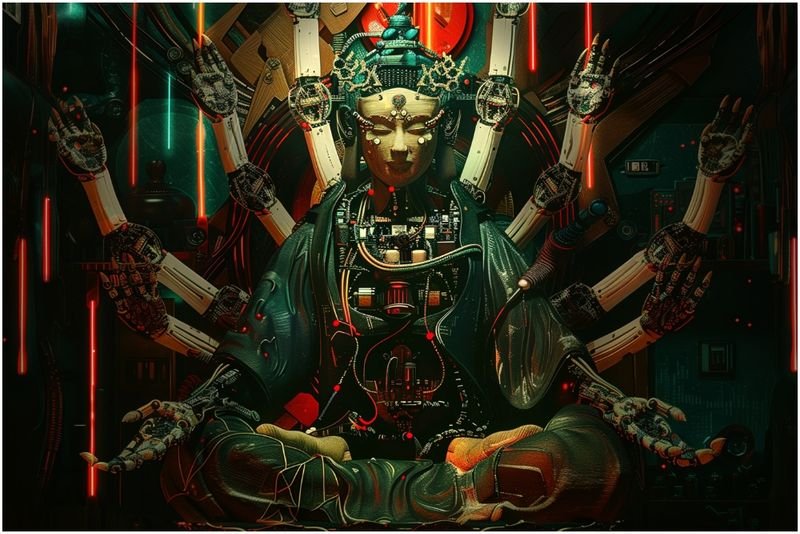
Dogmaverse Photo by Variety
Dogmaverse
In an ambitious new animated series, Taiwan-based production companies Luckysparks and AGE Creative have launched “Dogmaverse,” a thought-provoking anthology exploring how cutting-edge technology intersects with traditional faith and human spirituality in a dystopian future. “Dogmaverse” takes viewers through a world grappling with technological advancements that challenge, reshape, and often clash with religious beliefs, all set against a visually stunning animated backdrop.
With the series slated to begin production in May 2026, “Dogmaverse” stands out for its unique storytelling format: each episode introduces fresh characters and settings, yet all are connected through overarching themes. This article explores the concept behind “Dogmaverse,” its historical and cultural influences, advancements in animation, and what experts and creators say about its potential impact.
The Story of Dogmaverse: Inspiration Rooted in Real Experiences
The concept for “Dogmaverse” stems from personal experiences of the show’s creators. Director Henry Chen, who attended an international Christian school in Taiwan despite coming from a Buddhist family, reflects on his sense of living “inside a bubble” of religious indoctrination. This personal history of navigating different beliefs inspired him to explore parallels between religious indoctrination and today’s tech culture.
Technology Meets Faith: Is Belief Being Rewired?
“Dogmaverse” tackles the question of whether technology fundamentally alters human emotions and beliefs. In today’s digital landscape, people often turn to AI-driven content for answers and guidance, a trend with striking similarities to traditional religious practices. Algorithms now recommend what we watch, read, and even believe, creating echo chambers that reinforce polarized opinions. Chen reflects on this impact, noting, “In this world of oversaturated content and algorithmic marketing, our emotions are constantly pushed toward the extreme ends of the spectrum.”
This exploration of technological indoctrination through fictional storytelling offers viewers a chance to examine how they might be influenced by their devices and online experiences in ways they may not realize.
Real-World Applications: How Technology Shapes Cultural Narratives
“Dogmaverse” will bring a global perspective to its episodes by partnering with multiple animation studios. According to producer Charlie Chen, this approach allows each episode to incorporate diverse cultural insights and artistic interpretations, emphasizing how technology’s role in spirituality might differ across cultures. These collaborations also highlight the capacity of animation as a medium to convey complex themes across linguistic and cultural boundaries.
In terms of real-world applications, the series emphasizes how media, AI, and storytelling shape public perception and personal belief systems. Just as social media algorithms push certain narratives, each episode of “Dogmaverse” explores how characters navigate worlds where technology influences—and sometimes dictates—what they believe.
The Art and Science of Animation: A Technical Marvel
The technical side of “Dogmaverse” brings its own set of challenges and innovations. With the animation industry continuously evolving, Taiwan’s animation studios, particularly Hi-Organic, are known for pushing boundaries in visual effects. Executive producer Su Po-wei’s Hi-Organic brings extensive experience, having earned multiple Golden Horse and Golden Melody nominations. Each episode will likely leverage cutting-edge animation techniques, adding layers of visual richness to the complex narrative themes.
Additionally, AGE Creative, led by director Parker Shen, will contribute its own expertise in blending creative visual elements with storytelling. AGE Creative’s past work, including the award-winning animated music video series “Mutant,” showcases its knack for combining storytelling with visual expression—an asset that will enhance the thematic depth of “Dogmaverse.”
The Future of Technology and Faith
As “Dogmaverse” challenges viewers to consider the potential consequences of technology’s growing role in society, experts offer varied perspectives on these themes. Media theorist Dr. Alexis Tan suggests that “Dogmaverse” could serve as an important cultural critique: “In a world where technology is increasingly viewed as a new kind of salvation, a series like ‘Dogmaverse’ asks viewers to confront uncomfortable questions about dependence on AI and tech. It’s timely, and it’s necessary.”
On the other hand, tech ethicist Susan Lay sees the series as a cautionary tale: “When we place our trust in AI to answer existential questions, we need to be aware of the bias and limitations that may come with it. A show like ‘Dogmaverse’ raises awareness of the potential pitfalls of putting too much faith in technology.”
How Does Technology Influence Your Beliefs?
“Dogmaverse” is not only a captivating series but a timely exploration of how technology impacts our beliefs, emotions, and social interactions. By blending fiction with real-world dilemmas, it opens the floor to conversations about the fine line between technological advancement and societal control.
As the series unfolds, it will likely leave audiences questioning: Are we becoming too dependent on technology as a guide for our beliefs and values? And in a world that increasingly looks to AI for answers, where do we draw the line between innovation and indoctrination?
Ultimately, “Dogmaverse” doesn’t just entertain—it challenges viewers to reflect on the influence of technology in their own lives, making it a powerful addition to the conversation on faith, identity, and the future of human connection in an ever-digital world.





